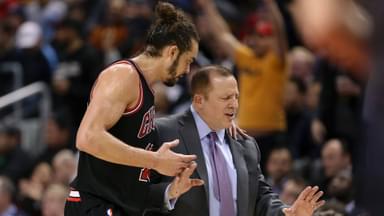Being a head coach in professional sports is often viewed as a thankless job. The players are celebrated for the wins, whereas the playcallers, the head coaches of the world, are the ones who absorb the blame for losses.
Advertisement
The NBA, as a whole, exemplifies this sharp imbalance. Tom Thibodeau’s five-year tenure with the New York Knicks is yet another example of how unforgiving the job can be. He led the Knicks to their first Eastern Conference Finals appearance in 25 years. Two weeks later, the Knicks fired him after losing 4–2 to Indiana.
Thibodeau did not resign—he got fired. Or, according to famed NBA insider Shams Charania, the Knicks relieved “Tom Thibodeau of his duties.” One playoff loss has seemingly erased years of progress. Five years, to be exact. Prior to this, the Knicks had been dwelling in a prolonged cesspool of purgatory, to the delight of many a Knicks-hater.
The move to relieve Thibs “of his duties” sent shockwaves to many across the landscape of the sport. How can a person who has achieved too much (especially when no one thought the Knicks would be this good) be let go like this? Mike Malone, anyone?
Subsequently, the move also sent a harsh message to future coaches. Today, many former players reconsider coaching careers, especially after seeing how quickly results get forgotten.
When asked about coaching, in reference to who would take over the Knicks’ head coaching role on ESPN’s NBA Today show, Miami Heat legend Udonis Haslem, as candid as ever, had a lot to say.
“Let me just tell you this: This is the reason why when I retired, I said “Hell No!” to coaching. I wanted no parts of it because I understood now this is about the players. There was a time when I came in the league, a coach would say I need this guy, that guy, this guy,” he said passionately. “Now, it’s in the reverse. The players go and say we need this coach, that coach, this coach. It’s a completely different ball game.”
Udonis Haslem made that position clear while also inadvertently pointing out that the NBA being a “player’s league” is part of the broader issue. Before the panel shifted to focus on the type of players the Knicks would need to bring in to help change their fortunes, Haslem called out the players on the Knicks’ roster who had failed their head coach.
“To whom much is given, much is required. You can’t just play one end of the basketball court and think you’re going to win a championship”, he said.
Haslem spent 20 seasons demanding full effort on both ends of the court. Today, he sees players avoid criticism while coaches take the heat. That shift in dynamics has discouraged many respected veterans from joining the sidelines; instead, many have jumped into the sports media space, launching their own podcasts and production companies.
Thibodeau always demanded effort and focus. His coaching identity relied on defense, discipline, and outworking more talented opponents. In 2024–25, the Knicks finished 51–31 and eliminated the top-seeded Boston Celtics. The season marked a huge step forward for the historic franchise. Still, the front office acted swiftly after losing to Indiana.
Critics blamed Thibodeau’s strict style and heavy starter usage. His main lineup played 226 more minutes than any other unit in the league. That created fatigue and stunted bench development. Offensively, they became predictable, especially against Indiana’s sharp defensive coverages.
However, not all blame falls on the coach. Karl-Anthony Towns and Jalen Brunson struggled defensively in key moments. Injuries and poor roster balance also hurt their playoff chances. Some believe the front office gave Thibodeau flawed tools. Others say the team needed a fresh voice in the locker room.
That’s where comparisons to the Miami Heat become striking. The Heat chose patience, and that choice paid off long-term. Erik Spoelstra has coached the Heat for 17 seasons. Under him, Miami reached the NBA Finals six times and won two championships. They stuck with Spoelstra through superstars leaving and rosters reshuffling. Their organizational trust built one of basketball’s most stable cultures—the much-famed Heat Culture.
The contrast is clear: stick with a system or chase change and risk constant resets. As NBA teams review their coaching futures this summer, Thibodeau’s dismissal sends a loud warning. His case shows how little margin coaches get—even after success. Haslem’s words echo that reality.
Coaching remains one of sports’ toughest jobs. It demands total effort and often gets no reward. Legends like Haslem see that clearly. And they will keep saying “HELL NO!” to the sidelines.








